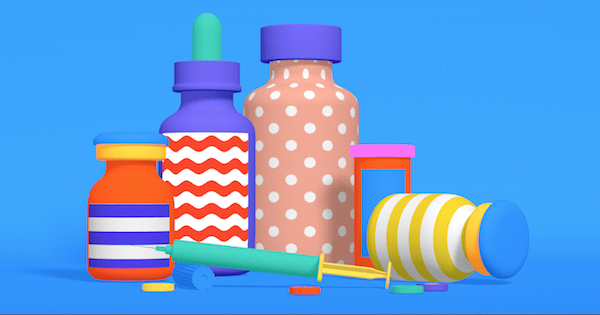The Alternatives
Some might say the resurgence of research into the therapeutic potentials of controlled substances started with MDMA, which works on the same serotonin transporter that SSRIs target. But, instead of blocking the reuptake of serotonin, it holds the door wide open, causing a flood of serotonin into the synapse, explains Dr. McKenna. Now, there are large-scale investigations into MDMA’s potential for treating post-traumatic stress disorder (PTSD). These studies have found that therapy sessions — with the assistance of MDMA — can be the perfect catalyst to work through the paranoia and anxiety characteristic of PTSD.
MDMA may help with other types of anxiety as well. “MDMA helped me overcome social anxieties,” says 18-year-old reddit user (and r/drugs frequenter) Shirrapikachu. “I had an entirely new perspective on the world and how you interact with people. I learned that people are a lot more accepting and kind than I originally thought, and a little confidence goes a long way in making new friends and approaching people,” she says. “From that point on, I basically faked it until it became a reality, and quit caring so much about how people saw me.”
Mark, another 19-year-old reddit user, first tried ecstasy at a festival two years ago before experimenting with the drug’s purer form, MDMA. He describes similar insights: “I learned that those ‘self-preservation’ thoughts that stop you from doing stuff and cause anxiety are not permanently a part of me,” he says. “Doing a drug that makes you a happy version of yourself, without anxiety, will teach you a lot about how to reduce those aspects in your [normal] life.”
Classic psychedelics have shown similar benefits. Researchers have found that psilocybin — the psychoactive component in psychedelic mushrooms — can reduce the existential, end-of-life anxiety in dying cancer patients. Similarly, LSD has been found to reduce anxiety in conjunction with therapy in double-blind, placebo-controlled studies. And, both of these drugs target the serotonin receptors.
Much of the work with MDMA has been spearheaded by the Multidisciplinary Association for Psychedelic Studies (MAPS). But, the Heffter Research Institute (of which Dr. McKenna is a co-founder) has organized the majority of psilocybin work.
Unlike when they were using SSRIs, people in these trials felt real change after just one session. And, this wasn’t just feeling better; big existential questions were being answered. As Shirrapikachu put it, “LSD trips have been tough and magical, and helped me make huge leaps in my therapy. Years of progress made easy.”
When Adrienne, 31, a social worker, first tried LSD, she was in the middle of one of the most difficult periods of her life. “I could not look in the mirror without crying and wanting to kill myself,” she says. But, 10 years ago, she had a life-changing acid trip. Her mind went straight to a photo from her childhood, when she was about seven years old. “I’m sitting on a rock by a lake, staring at the camera with this awesome, confident smile,” she says. “All I could think of is that I’m still that little girl somewhere inside, and I just have to find her.”
Obviously, unless you’re taking part in a study, your therapist probably isn’t going to be keen on you dropping acid during your session. And, for the time being, your insurance definitely isn’t going to cover your MDMA costs. But, in the future, Dr. McKenna says all of these substances would ideally be taken under strict supervision and guidance. “You need the assistance of a therapist to help integrate that experience,” he says. “This is never going to be like, ‘Take two and call me in the morning.’”
“If you did take two,” he adds, “chances are you’d forget to call in the morning.”
